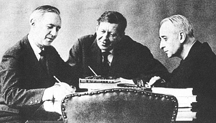 My mother was a live book reviewer in Cleveland, an activity that seems to have gone the way of the traveling magic lantern lecture tent show. Fortunately for Mom, the traffic lights in our community were exceedingly slow, and she always had a book by her side. We joked that she had completed War and Peace just by judicious use of her time at red lights.
My mother was a live book reviewer in Cleveland, an activity that seems to have gone the way of the traveling magic lantern lecture tent show. Fortunately for Mom, the traffic lights in our community were exceedingly slow, and she always had a book by her side. We joked that she had completed War and Peace just by judicious use of her time at red lights.
Book reviewers were prime entertainment at women’s organizations until somewhere around the late 1960s, possibly replaced by book clubs where everyone was supposed to actually read the book for themselves. Until then, the job of the book reviewer was to bring the ideas in important books to life for a whole community, to put it into context, to enrich the listener. The expectation that most of the audience would rush out and purchase the book, as Oprah’s audience does today, was not there. With a good book reviewer, you didn’t need to do any stinking page turning yourself.
Oprah was broadcasting from Cleveland in those days. I wonder if she and my mom crossed paths.
Live book reviewers like my mom addressed one of the great challenges to living well — having that feeling that you’re living authentically and thoroughly in your times. To me, it would have been a terrible thing to have been living down the street from the Théâtre des Champs-Elysées in Paris in May, 1913 when Stravinsky’s Le Sacre du Printemps had its premiere, and not been part of the commotion. Or to have been on earth in the early 1960s and not heard I Want to Hold Your Hand on the radio. Or lived in Elizabethan England and never been to the Globe and seen a play by that Shakespeare fellow.
Knowing what’s going on, what new ideas are shaping the culture, in the arts, in technology, in ideas in general seems to me to be an essential part of really being alive, of getting all that life has to offer. The great challenge for me is in finding out how to ferret out what’s new and valuable.
In the early days of the Web, the rage was all about filters. The idea of filters dangled in front of us the promise that we would be able to customize our news sources, so we could “get the news we wanted.” And we could even join groups where everyone in the world interested in a topic could be a member. I, for one, joined a harpsichord builders listserv, and wore out my life-long passion for the harpsichord in a little under two months. Those were dark times. I even began to agree with George Bernard Shaw’s remark that a harpsichord sounded like two skeletons copulating on a tin roof. But I digress.
Still looking for filters, I joined a Linkedin innovation community. Turns out it’s just a bunch of innovation consultants trying to sell their services to each other. Good luck. New content: 4%. Recycled ideas: 96%.
It turns out that I don’t want filters. I want scouts. I want to know who those people are, with taste and smarts and reasonable critical faculties, who can find the surprises. Books I never would have found on my own. New genius composers living in Serbia. An avant-garde filmmaker in Finland.
In 1951 Lionel Trilling, Jacques Barzun, and W.H. Auden decided to become scouts for important new books. They felt the existing book clubs, namely The Book-of-the-Month Club and the Literary Guild had lowered their original goals and now were pursuing the “safely popular.” Their new club, the Readers’ Subscription, had the goal of supplying readers with books of solid intellectual merit. Every four weeks their little flyer, The Griffin, offered their choices for main book and alternates, and before long they had some forty-thousand subscribers. The Club went through many changes, and I was a member until The Griffin suddenly started shrinking some five years ago. The Club was now a Doubleday Club, somewhere in the bowels of Random House, now a mere division of Bertelsmann Aktiengesellschaft, which had, ironically, grown from being primarily a printer of calendars to a book giant through the creation of their own book clubs in post war Germany.
The Readers’ Subscription was my favorite scout for important new books, and when it was put down, I thought I would be able to find a replacement for it on the Web, or somewhere. But that hasn’t happened. A group of really smart people need to do the work, and find a way to get paid for scouting, without creating a conflict of interest.
I’ll be scouting for better scouts, now that I know that’s what we need. Maybe it just comes down to more moms grabbing a paragraph of Tolstoy while waiting for that slow, slow, slow red light to turn green.
Leave a Reply
You must be logged in to post a comment.